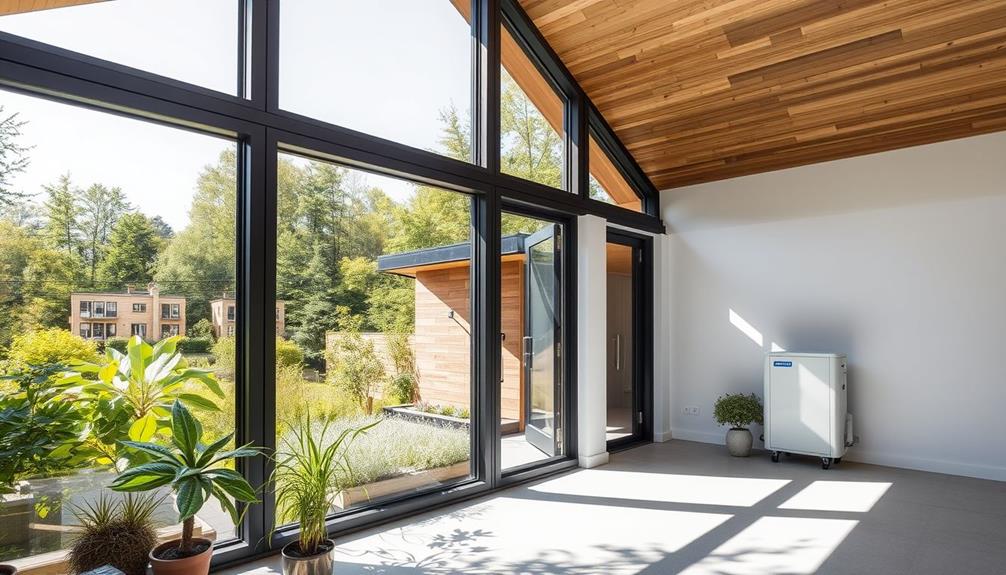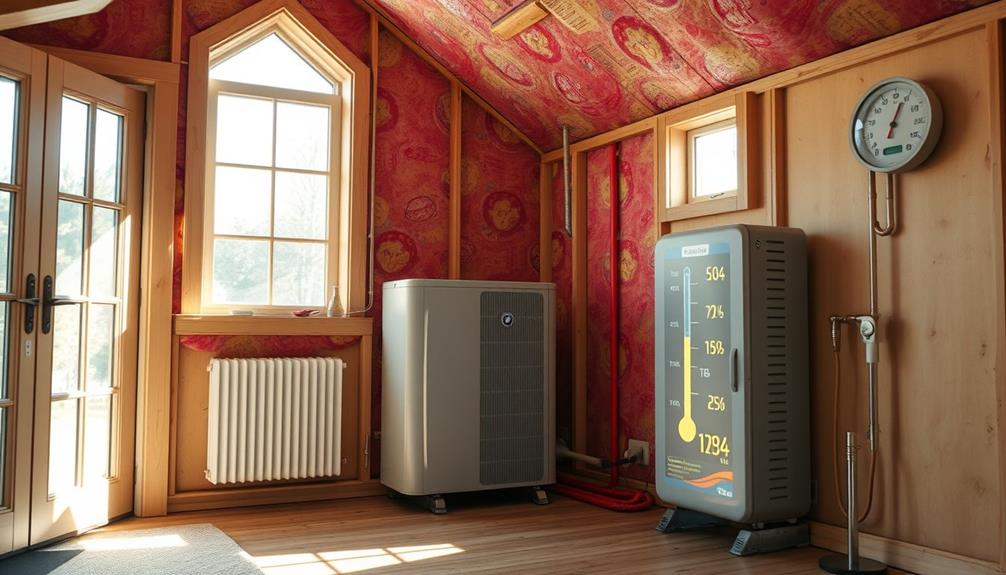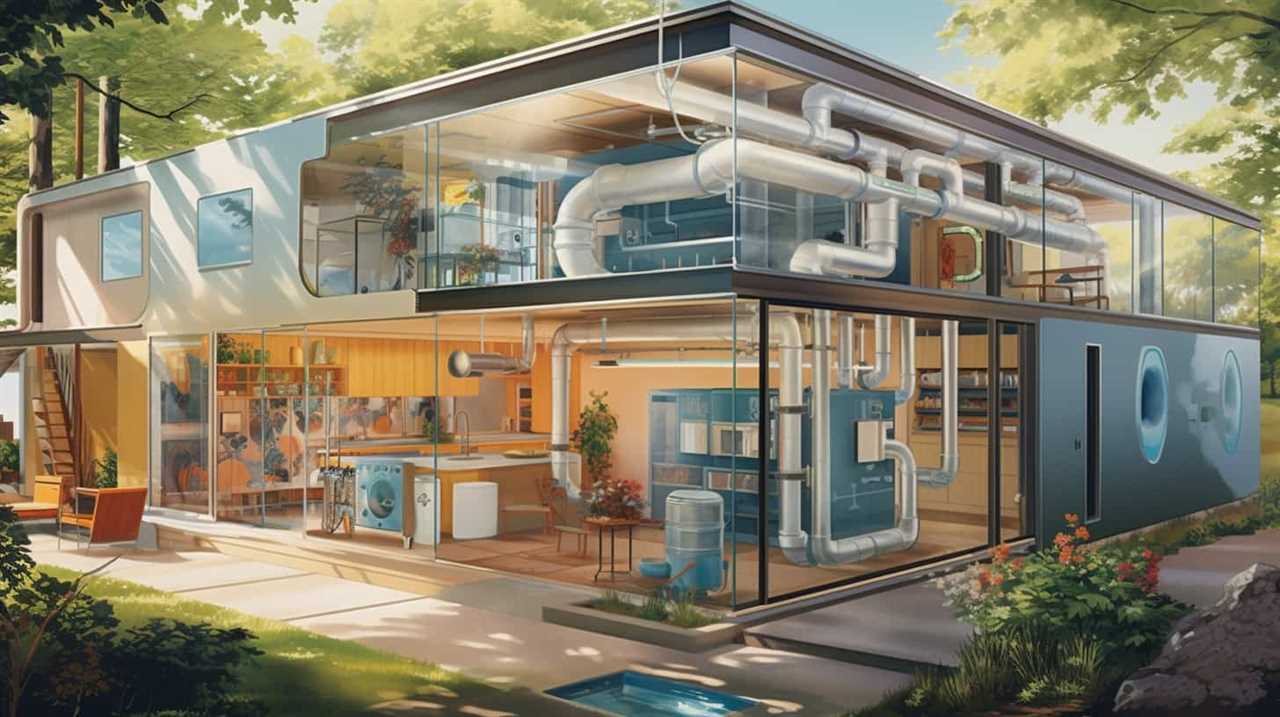Modern heat pumps are quieter than ever, with some ultra-quiet models operating at just 40 decibels, which is like the sound of rustling leaves. Most units now run between 50 to 70 decibels, similar to a normal conversation. Advanced designs, like variable-speed compressors, reduce noise during operation. Proper installation and regular maintenance are key to keeping noise levels low. If you notice unusual sounds, they could indicate issues that need attention. By choosing the right model and maintaining it well, you'll enjoy a serene environment while staying comfortable. Discover more about these innovations and benefits.
Key Takeaways
- Modern heat pumps operate at sound levels as low as 40-50 decibels, comparable to a normal conversation or rustling leaves.
- Advanced design features, including variable-speed compressors and insulation, significantly reduce noise transmission during operation.
- Proper installation and maintenance, including vibration-dampening materials, enhance quiet operation and minimize disruptive sounds.
- Regular cleaning and inspection of components prevent excessive noise from worn bearings, misaligned blades, and duct leaks.
- Newer heat pump models outperform older systems in noise reduction, addressing previous concerns about excessive operational sounds.
Understanding Heat Pump Noise Levels
When considering a heat pump for your home, it's essential to understand the noise levels associated with modern systems. Most heat pumps operate between 50 to 70 decibels, which is comparable to normal conversation. That means you won't have to worry about disruptive heat pump noise when relaxing at home.
If you're looking for even quieter options, ultra-quiet models can achieve sound ratings as low as 40 decibels, similar to the gentle rustling of leaves.
Advancements in innovations in heat pump technology have greatly contributed to reducing noise levels, making them more suitable for residential environments. Outdoor units typically average around 60 decibels, akin to moderate rainfall, while indoor units can run as quietly as 18 to 30 decibels.
Factors like fan and compressor design greatly influence these noise levels. Variable-speed options are particularly effective at reducing noise during operation, ensuring a more peaceful environment.
Additionally, proper installation plays a key role in minimizing noise impact. Using vibration-absorbing mounts and selecting the best placement for your heat pump can enhance its quiet operation further.
With the right choice, you can enjoy the comfort of heating and cooling without excessive noise intruding on your daily life.
Common Heat Pump Noises
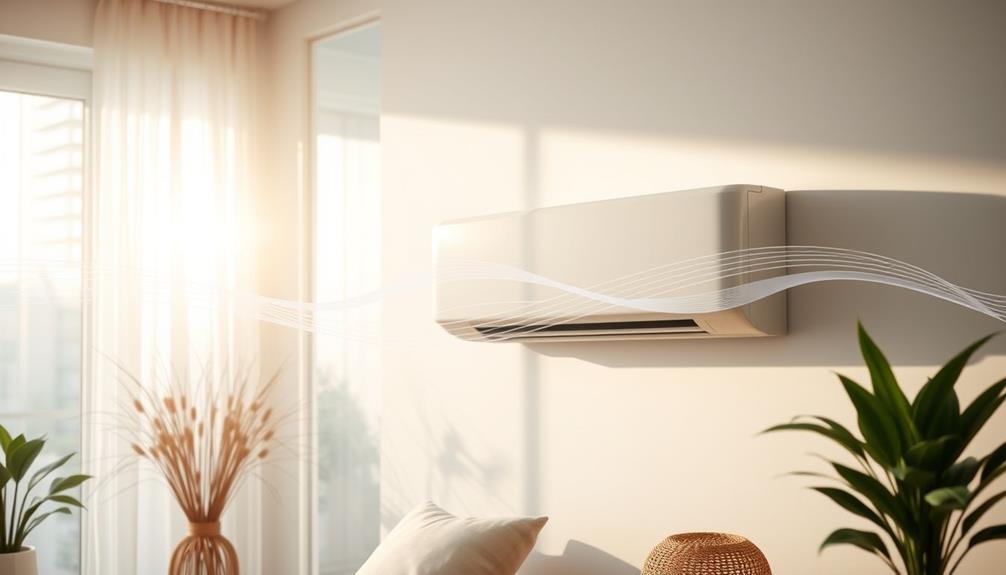
When you listen to your heat pump, you might hear humming, buzzing, or rattling, which are usually normal sounds during operation.
These sounds can be comparable to the quiet operation of garage door openers, designed to enhance the comfort of your home without being disruptive.
However, if you notice loud or persistent noises, it's crucial to identify their source, as they could indicate potential issues.
Understanding these common noises helps you distinguish between what's typical and what's cause for concern.
Normal Operational Sounds
A heat pump's normal operational sounds can be quite familiar to homeowners. When your system runs, you'll likely hear a mix of humming and soft rattling. These normal operational sounds usually occur during standard functioning and are considered acceptable levels of noise.
Typically, heat pumps generate an average noise level ranging from 50 to 70 decibels, which is comparable to normal conversation or the gentle patter of moderate rainfall. It's worth mentioning that just like ozone air purifiers can effectively eliminate allergens, a well-functioning heat pump should also contribute to a healthier indoor environment by maintaining a stable temperature.
During startup, you might notice mild rattling from the fan and vibrations from the compressor as the system engages. Whistling sounds can sometimes indicate air passing through duct leaks, while gurgling noises often relate to refrigerant flow within the system. It's important to recognize that these sounds are part of your heat pump's regular operation.
Generally, operational sounds shouldn't exceed 75 decibels. If you notice the noise generated by your heat pump becoming louder or unusual, it might be time to investigate further.
Keeping an ear out for these normal operational sounds will help you maintain a comfortable living environment while ensuring your system runs efficiently.
Identifying Unusual Noises
Identifying unusual noises from your heat pump can save you from costly repairs and keep your system running efficiently. While some sounds are normal, others may signal potential issues. Understanding common heat pump sounds can help you troubleshoot effectively.
Here are three common noises to watch out for:
- Hissing or Gurgling: These sounds often indicate refrigerant problems. A hissing noise may mean low refrigerant levels or leaks, while gurgling suggests issues with refrigerant flow.
- Whistling: If you hear whistling, it could point to ductwork damage, often stemming from leaks in the attic or walls. This noise can affect your heat pump unit's efficiency.
- Vibrating or Rattling: Vibrating noises may arise from improper mounting or loose internal parts. Rattling sounds, especially during startup, can occur as the fan activates or due to compressor engagement.
If you notice any of these unusual noises, it's crucial to address them promptly. Ignoring these signs can lead to more significant issues down the road, impacting both your comfort and your wallet.
Stay attentive to your heat pump unit's sounds, and you'll guarantee smoother operation for years to come.
Common Noise Sources
Unusual noises from your heat pump can often point to specific sources of concern. Common noise sources include compressor noise, which often comes as humming, buzzing, or rattling. These sounds might indicate worn bearings or refrigerant leaks.
You might also notice fan noise, usually caused by misaligned blades or debris accumulation, leading to excessive sounds during operation. Regular maintenance is important to prevent such issues, similar to how dog health and care requires attention to avoid complications.
Airflow noise, such as whistling or hissing, typically originates from duct leaks or airflow blockages disrupting your system's efficiency. If you hear rattling or clanking, it may be due to loose components that make loud noise, signaling potential mechanical issues that require your attention.
Another common culprit is motor issues, presenting as high-pitched squealing noises. This often indicates malfunctions that need professional inspection and repair.
Sources of Unusual Sounds

When you hear unusual sounds from your heat pump, it's vital to identify the source. Noises like humming from the compressor or rattling from loose components could signal underlying mechanical problems.
Additionally, it's important to assess the unit's installation to prevent any issues related to improper setup. Addressing these sounds early can save you from costly repairs and guarantee your system runs efficiently.
For homeowners, understanding the essential home cleaning kit items can also help maintain a clean environment while monitoring appliance performance.
Common Heat Pump Noises
Many heat pump owners notice a range of sounds during operation, which can be perfectly normal, but some noises warrant attention. While common heat pump noises like humming, buzzing, and rattling are typical, it's vital to differentiate between normal conversation levels and abnormal noises that could signal issues.
Regular inspections can prevent potential problems just as they do for toilet maintenance.
Here are three common sources of unusual sounds you might encounter:
- Compressor Noise: Worn bearings can lead to a loud humming or grinding sound. If you hear this, it's worth having it checked.
- Fan Noise: Misaligned blades or debris can cause rattling or whooshing. Regular cleaning and maintenance can help prevent this.
- Airflow Noise: Constant whistling often signifies damaged ductwork, while gurgling may indicate refrigerant flow problems.
If you notice these abnormal noises, it's important to take them seriously. Metal-on-metal sounds or persistent issues often require professional inspection.
Mechanical Problem Indicators
Identifying mechanical problems in your heat pump often starts with paying attention to the sounds it makes. If you hear unusual humming or buzzing from the compressor, it might signal worn bearings or refrigerant leaks that require immediate attention.
Strong problem-solving skills facilitate effective solutions in diagnosing these issues. Rattling noises during startup could mean loose components within the unit, which can lead to more severe mechanical issues if not addressed promptly.
Constant whistling sounds often point to damaged ductwork, typically originating from the attic or walls, and can affect your system's efficiency.
Loud vibrating noises usually indicate improper mounting or misalignment of internal components, demanding a professional evaluation to prevent further damage.
Additionally, gurgling noises related to refrigerant flow issues may signal low refrigerant levels or blockages, emphasizing the need for a professional diagnosis and repair from an HVAC technician.
Staying vigilant about these sounds can help you catch potential problems early, ensuring your heat pump operates smoothly and efficiently.
Don't ignore these indicators; addressing them promptly can save you from more extensive and costly repairs down the line.
Maintenance and Noise Control
To keep your heat pump running quietly and efficiently, regular maintenance is essential. By caring for your system, you can greatly reduce noise and prevent costly repairs. Incorporating a balanced routine, similar to gout management insights, can help maintain the overall health of your heat pump.
Here are three common sources of unusual sounds you might encounter:
- Compressor Noise: Worn bearings can lead to loud compressor sounds, indicating a need for lubrication or replacement.
- Fan Noise: Misaligned blades or debris can create annoying fan noise. Regular cleaning and adjustments can help maintain quiet operation.
- Airflow Noise: Duct leaks or blockages can result in disruptive airflow noise. Inspecting and sealing ducts during maintenance can alleviate this issue.
Additionally, loose components often lead to rattling or clanking noises, signaling potential problems that require your immediate attention.
High-pitched squealing sounds might indicate motor malfunctions, which should be addressed promptly to avoid further damage.
Scheduling annual professional check-ups can help identify and rectify these noise issues before they escalate, ensuring your heat pump remains a quiet, efficient part of your home.
Prioritizing maintenance not only reduces noise but also extends the lifespan and performance of your heating and cooling system.
Myths About Heat Pump Noise

Heat pump noise is often misunderstood, leading to several common myths that can cause unnecessary concern.
One myth is that all heat pumps are noisy. In reality, modern heat pumps are designed for quiet operation, often generating noise levels as low as 40-50 decibels—comparable to rustling leaves. Adopting a holistic lifestyle approach can also help in managing the stress associated with home maintenance concerns, including noise.
Another misconception is that noise from heat pumps is unavoidable. However, excessive noise typically signals underlying issues that can be resolved with regular maintenance and repairs.
Some believe soundproofing measures can't effectively reduce noise, but that's not true. Installing sound panels and using vibration-dampening materials can greatly lower perceived noise levels.
Additionally, it's a common myth that only older heat pump models generate loud noises. Thanks to advancements in technology, newer units outperform their predecessors in both noise reduction and efficiency.
Tips for Quieter Operation

Modern heat pumps can operate quietly, but there are several steps you can take to enhance this benefit even further.
By focusing on proper installation, regular maintenance, and soundproofing measures, you can considerably reduce noise levels from your unit.
Here are three essential tips:
- Ensure Proper Installation: Have a professional install your heat pump. This helps prevent vibrations and misalignments that can cause excess noise. A well-placed unit operates more smoothly and quietly.
- Schedule Annual Maintenance: Regular maintenance is key to maintaining peak performance. Clean and lubricate components as needed to minimize friction and prevent unnecessary noise production.
- Implement Insulation Measures: Insulating your home and ductwork can absorb sound, reducing the transmission of noise from your heat pump.
Additionally, regularly remove debris from outdoor units to prevent excessive fan noise during peak usage.
Maintenance for Noise Reduction

Regular maintenance is vital for keeping your heat pump running quietly and efficiently. By scheduling annual check-ups, you can prevent unnecessary noise production, guaranteeing that your system operates at its best.
During these maintenance visits, professionals will clean and service various components of a heat pump, such as filters and fans. This not only enhances performance but also markedly reduces operational sounds.
Another key aspect is the insulated compressors found in modern heat pumps, which contribute to quieter operation. They minimize the noise generated during both heating and cooling processes.
Adhering to manufacturer maintenance guidelines guarantees that all parts function correctly, which is essential for maintaining a lower noise level.
Don't overlook the importance of identifying potential issues early. Regular maintenance can pinpoint problems before they escalate into louder, more disruptive noises.
Benefits of Modern Heat Pumps

Experience the advantages of contemporary heat pumps, which bring a wealth of benefits to your home. One of the standout features is their quiet operation, addressing previous noise concerns that often came with older systems.
Here are three key benefits of modern heat pumps:
- Reduced Noise Levels: Modern heat pumps operate at sound levels as low as 40-50 decibels, comparable to a quiet conversation. This means you can enjoy a peaceful environment without constant background noise.
- Advanced Technology: With variable-speed compressors, these systems adjust to your heating or cooling needs smoothly, eliminating abrupt noise changes that can be disruptive in your daily life.
- Enhanced Design Features: New models incorporate insulation and vibration-dampening features, considerably minimizing sound transmission. Ground source heat pumps are particularly quiet, averaging around 42 decibels, similar to the sound of a refrigerator.
Solutions for Noise Issues
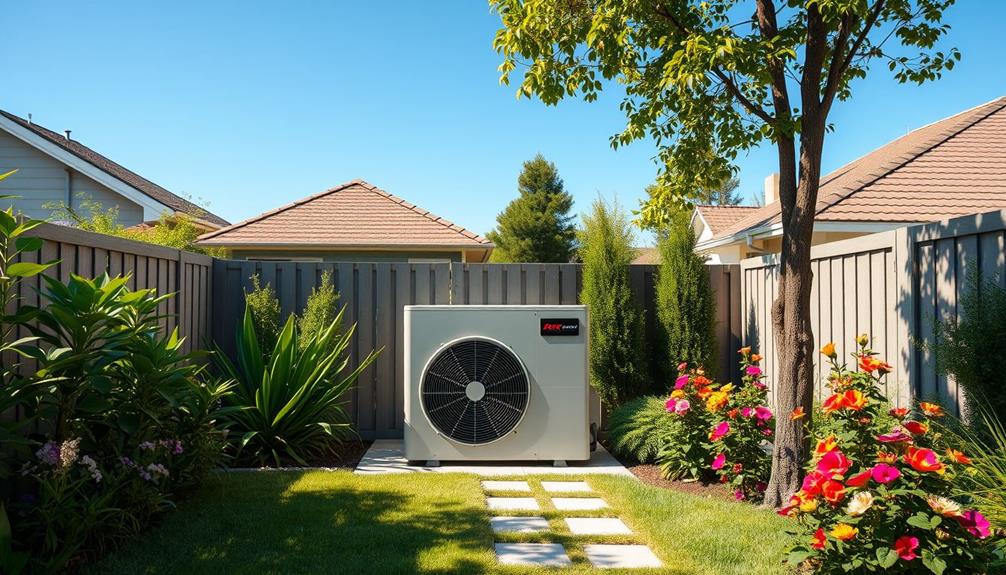
While modern heat pumps are designed to operate quietly, some homeowners may still encounter noise issues. One effective solution is ensuring the proper placement of your heat pump system. Position it away from windows and adjacent structures to markedly reduce perceived noise levels.
Additionally, consider installing sound panels, particularly weatherproof ones, around outdoor units. These can absorb noise and prevent sound from transmitting into living spaces. Utilizing barriers like fences, landscaping, or decks can further disrupt sound pathways, minimizing the impact of noise from your outdoor unit.
Regular maintenance is essential for maintaining a quiet operation. Cleaning and lubricating components prevents excessive noise production and keeps your system running smoothly.
Embracing advanced technology in modern heat pumps, such as variable-speed compressors and soft start functions, can also help minimize abrupt noise changes, ensuring a more peaceful environment.
Customer Support and Resources

When you face issues with your heat pump, reliable customer support is just a call away. You can count on assistance seven days a week, ensuring that help is available whenever you need it.
Whether it's a minor question or a major concern, you'll find dedicated resources to address your needs effectively.
Here are three key features of the customer support system for heat pumps:
- Urgent Hotline: For immediate help with urgent heat pump issues, a dedicated hotline connects you with experts ready to assist.
- Online Messaging: If you prefer a more convenient option, you can easily submit your questions through online messaging and receive prompt responses.
- Regional Service Numbers: Access tailored support by using the regional service numbers, ensuring you're connected to the right resources for your location.
Additionally, subscribing to newsletters helps you stay informed on promotions and seasonal reminders, enhancing your overall home comfort.
With these customer support options, you can confidently manage your heat pump and keep your home comfortable year-round.
Frequently Asked Questions
Are Newer Heat Pumps Quieter?
Yes, newer heat pumps are quieter. They typically operate at 50 to 60 decibels, comparable to a conversation. With advanced designs and features, you'll notice a significant reduction in noise compared to older models.
Why Is My Brand New Heat Pump so Loud?
If your heat pump sounds like a thunderstorm, it might be due to improper installation or loose components. Check for misalignments and make certain everything's secured; regular maintenance can help keep the noise down and efficiency up.
Which Heat Pump Is the Quietest?
When you're looking for the quietest heat pump, consider ultra-quiet air source models rated at 40 decibels or ground source heat pumps operating around 42 decibels—both options minimize sound without sacrificing efficiency or comfort.
What Is the Noise Problem With Heat Pumps?
Heat pumps can create noise issues, especially if placed near living spaces. Mechanical problems like worn compressors or loose parts can lead to annoying sounds. Ensuring proper installation and maintenance can help minimize these disturbances for you.
Conclusion
To sum up, modern heat pumps are impressively quiet, often operating at just 50 decibels—quieter than a normal conversation! This not only enhances your comfort at home but also contributes to a more peaceful environment. By understanding noise levels, addressing unusual sounds, and following maintenance tips, you can fully enjoy the benefits of your heat pump. With these advancements, you can rest easy knowing your heating system won't disrupt your daily life.


